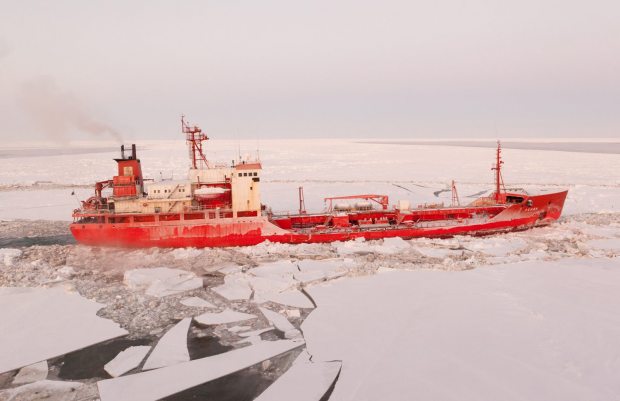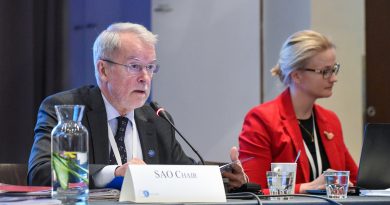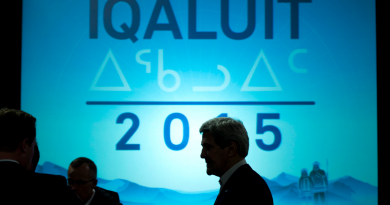Arctic Strategy: U.S. looks toward Last Frontier, will investment follow?

Hours after the White House announced it had signed the National Strategy for the Arctic Region, Alaskans began to put into perspective what the high-level event really means for the Last Frontier.
Many of Alaska’s stakeholders were briefed early in the day during a phone call with the White House. The strategy is the U.S. version of similar commitments made by Canada, Norway, Denmark, Iceland, Finland, Russia, and Sweden.
As the only U.S. state bordering the Arctic region, Alaska is poised to play a prominent role, provided the White House makes good on its promises to coordinate efforts among all levels of government as well as tribal interests. In a statement released to the press, Alaska Gov. Sean Parnell welcomed President Obama’s “acknowledgement that the Arctic will play a significant role” in the nation’s future.
Symbolic strategy or northward pivot?
The document comes just as the world’s Arctic nations are preparing to meet in Sweden, and is viewed as a powerful symbol to America’s international Arctic neighbors that the U.S. is now serious about being a major player at the top of the earth.
“It is important for the U.S. to recognize that the Arctic is a very important part of not only the U.S. and its future — but also the world,” said Fran Ulmer, Chair of the United States Arctic Research Commission. “The adoption of a specific national strategy is a signal that the government takes seriously its responsibility as an Arctic nation.”
The U.S. first began developing an Arctic policy under President George W. Bush. Now, under President Barack Obama, the nation has arrived at a “strategy.” The next phase – where work transitions from talk to action – is one Alaskans appear cautiously optimistic – but wary — about.
“They’ve raised our expectations,” said Alaska Lt. Governor Mead Treadwell. “But our expectations have been raised before.”
The Arctic strategy has three main areas of focus:
- Advance United States security interests;
- Pursue responsible Arctic region stewardship; and
- Strengthen international cooperation.
Alaska Natives and the state government contributed to developing the strategy, and now that it’s signed, the Obama administration plans to come to the Last Frontier in an effort to build on those relationships. Next month, White House officials and others from key agencies are expected to arrive in Alaska for a series of roundtable discussions, according to a prepared statement made in conjunction with the release of the signed strategy.
“Tribes, corporations, government entities, indigenous people all need to be a part of the dialogue. As this evolves, those of us in the Arctic need to be vigilant about making sure that the things important to us are elevated in the discussion,” said Reggie Joule, who served as a representative in the Alaska Legislature before he getting elected to his current position as mayor of the Northwest Arctic Borough, which includes parts of the National Petroleum Reserve-Alaska along with shoreline on the Chukchi Sea.
Joule said protecting renewable resources like the fish and marine life hunters rely upon is an ever-present concern among his constituents. So is the ability to adapt to a rapidly changing environment – the same climate-change driven phenomenon that is elevating the Arctic as a new frontier for shipping, tourism and resource development.
The announced Arctic Strategy comes in advance of next week’s meeting of the Arctic Council in Sweden. The eight-member intergovernmental council is expected to sign an agreement on Marine Oil Pollution Preparedness and Response, in addition to reviewing scientific reports and making policy recommendations.
Secretary of State John Kerry will attend on behalf of the United States. U.S. Sen. Lisa Murkowski, R-Alaska, will also attend.
Arctic policy is a thorny issue for Obama. Environmentalists want oil and gas development in the Arctic thwarted’ pro-development interests, including many Republicans, see Arctic oil-and-gas drilling through prisms of national security and domestic energy, a point explored Friday by The Hill news website.
An example of the distance between pro- and anti-Arctic development activists? Both sides point to the inaugural drilling season for Royal Dutch Shell, off Alaska’s northwest coast. Last summer, Shell endured a mishap-laden return to the Arctic, where it sought to drill exploratory wells for the first time since the 1980s. Both environmentalists and industrialists point to Shell’s experiences as proof of the unique challenges and opportunities that lay north of Alaska.
Development in one of Earth’s fastest-changing climates
The White House’s Arctic Strategy includes a reference to improving infrastructure and military assets to effectively protect the top of the nation. The document also states the nation wants to adapt to climate change, prepare for increased shipping traffic, protect local communities and the environment, and support resource development:
We seek an Arctic region that is stable and free of conflict, where nations act responsibly in a spirit of trust and cooperation, and where economic and energy resources are developed in a sustainable manner that also respects the fragile environment and the interests and cultures of indigenous peoples … As the United States addresses these opportunities and challenges, we will be guided by our central interests in the Arctic region, which include providing for the security of the United States; protecting the free flow of resources and commerce; protecting the environment; addressing the needs of indigenous communities; and enabling scientific research.
The document lays out lofty goals but stops short of specific commitments.
That’s not unusual, Ulmer said, though the U.S. strategy is leaner than similar declarations from other Arctic nations. Sweden, for example, has pledged to build an Arctic research station and provide the necessary support vessels, Ulmer said on Friday.
For its part, the closest the U.S. came to a financial pledge was this: “The unique Arctic environment will require a commitment by the United States to make judicious, coordinated infrastructure investment decisions, informed by science. To meet this challenge, we will need bold, innovative thinking that embraces and generates new and creative public-private and multinational cooperative models.”
What “coordinated infrastructure investment” means remains to be seen. In recent years, Alaska has undertaken serious study of developing a deep water port in the Arctic, a refuge for large ships that would be of value not only to the military but also to tourism and trans-national shipping.
Lt. Gov. Treadwell would like to have seen the document place greater emphasis on the Arctic’s potential as an economic jewel. “It doesn’t recognize the economic value that arctic energy, minerals and shipping have to the nation,” he said.
And, he said Alaska has seen the White House promise to include the state in talks before and then reject the state’s input, as with the federal decision last year to close much of the National Petroleum Reserve-Alaska to development.
This skepticism about what’s to come is why Treadwell, Ulmer and Joule say its now up to the Obama administration to prove it means what it says when it comes to taking the Arctic seriously.
“It’s one thing to put words on a piece of paper. It’s another thing to make it happen,” Ulmer said. “It’s not everything that we want, but it is way better than it has been.”
Contact Jill Burke at jill(at)alaskadispatch.com



